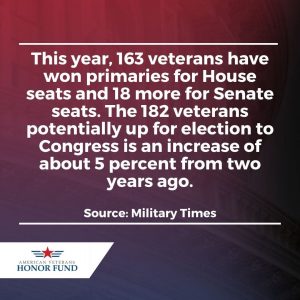In the 2020 Elections there were countless Veterans running for office. There were men and women who served in uniform who were up for election across this country as either incumbents or challengers. According to Military Times, “So far this year, 163 veterans have won primaries for House seats and 18 more for Senate seats. The 182 veterans potentially up for election to Congress is an increase of about 5 percent from two years ago.” Let’s take a look at some of the more notable races.
One of the most significant Senate races this year was for Republican Senator Joni Ernst’s seat in Iowa. According to ConnectingVets.Com, “Ernst is the first woman to represent her state in Congress and the first woman combat veteran elected to the Senate in United States history.” Ernst served in uniform for 23 years as a lieutenant colonel in both the Army Reserve & Iowa National guard. Ernst’s challenger, Democrat Theresa Greenfield, is not a Vet. Ernst was able to pull off a key victory, winning the race with 864,946 votes, or 51.8%.
Another important race in determining the balance of power in the Senate took place in Arizona. This race pitted two Veterans against each other. Republican incumbent, Martha McSally, versus Democrat challenger Mark Kelly. According to McSally’s campaign website, she served a total of 26 years in the US Air Force, “she deployed six times to the Middle East and Afghanistan, flying 325 combat hours and earning a Bronze Star and six air medals,” and is the first woman in US to fly a fighter jet in combat. Mark Kelly spent a combined 25 years in both the Navy & NASA. McSally had filled the late Senator and Veteran John McCain’s seat since he died in 2018, and this race was one of the most contentious of any Congressional race this year. Ultimately after over a week of counting, McSally conceded to Kelly who “earned 1,712,777 votes to McSally’s 1,633,439. Arizona has just over 10,000 votes left to count,” according to Patch.com.

The race between Republican candidate Sean Parnell and Democrat incumbent Conor Lamb was reflective of the contentious nature of the 2020 elections as a whole. Both candidates are Veterans; “Congressman Conor Lamb is a Marine and former federal prosecutor who represents Pennsylvania’s 17th district,” and Parnell is a retired Army Ranger and Combat Veteran. As happened in several races on election, the lead enjoyed by Parnell in the evening eventually evaporated as votes continued to flow into Pennsylvania precincts in the hours and days after November 3rd. As noted by Newsweek, Parnell refused to concede the race to Lamb, stating that every legal vote must be counted. Citing his campaign’s belief that the Pennsylvania state government violated its own election laws, Parnell brought lawsuits to have the state’s elections decertified. Eventually, his case was struck down by the Supreme Court, according to Patch.com. While Parnell has never officially conceded, the results of the election have Lamb winning reelection with 51.1% of the vote, according to The New York Times.
More money was raised against Republican Senator from South Carolina, and Air Force Veteran, Lindsey Graham than any other Senatorial candidate every. Graham has a long history of service in the Air Force, where he served as a member of the Judge Advocate General Corps. “For the bulk of his 33-year military career, Lindsey served in the U.S. Air Force Reserves. He retired in 2015 as a colonel,” according to his campaign website. Graham is the head of the Senate Judiciary Committee and has been viewed as a Trump ally. Democrats raised over $130m to knock him off his pedestal and get Democrat candidate Jaime Harrison elected, according to The State.com. A defeat would have marked an end to power which began in the House of Representatives in 1994. The record breaking fundraising didn’t help Harrison in the end, as Graham achieved a resounding victory, beating Harrison by 10 points with 54% of the vote, according to The New York Times.
These are some of the most notable races in which Veterans have won election into the Federal Government. But it is important to note that the overall representation of Veterans in Congress has been dwindling over time. According to Military Times, this trend will not be greatly reversed when the new Congress is seated in January. “…even with the boost in candidates, the number of veterans actually elected to office is unlikely to grow significantly in 2021, if at all. That’s because many of the races feature established incumbents or sit in districts heavily weighted toward one political party.”
Congressional and Senate races have not gone according to plan for Democrats hoping for a Blue Wave. One of the biggest takeaways thus far this Election 2020 is this: Republicans have appeared to keep their position of power as the Senate majority and have gained seats in the House of Representatives. Read more here.


